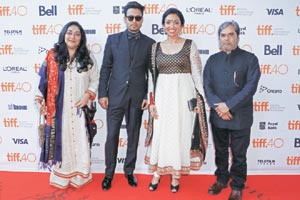IN THE closing moments of Mumbai-based director Leena Yadav’s Hindi film Parched, a group of angry young women rides away in a rickshaw, setting themselves free from the menfolk in their village. Set in Rajasthan, the latest venture of the Teen Patti director follows the predictable pattern of the rural Indian environment of Khap panchayats, wife-beating husbands and pampered boys. Only, it goes a bit further to show that when it comes to leading their lives, these battered women can be their own bosses. At the 40th Toronto International Film Festival (TIFF), which concludes today, it is an all-women show from India—in fact, the only male director in the lot is Gujarat-born Pan Nalin.
Filmmaker Meghna Gulzar’s Guilty joins Yadav’s Parched and Nalin’s Angry Indian Goddesses as part of the special presentations section of the Toronto festival, which began on September 10 this year. Deepa Mehta, an Indian-born filmmaker who has made Canada her home, returns to TIFF with Beeba Boys, the story of Indo-Canadian gangsters in Vancouver, while Indian-origin director Geeta Gandbhir joins forces with Oscar-winning Pakistani filmmaker Sharmeen Obaid-Chinoy to bring on screen the story of Bangladeshi women peacekeepers in earthquake-devastated Haiti in A Journey of a Thousand Miles. The list includes four other Indian women—Megha Ramaswamy, Shambhavi Kaul, Shai Heredia and Shumona Goel.
“This year has seen a cultural shift, with more women at the active centre of Indian films,” says Cameron Bailey, artistic director, TIFF, who travelled to Mumbai in July to select the Indian entries for the festival. In this cultural shift, Parched leads the way with its bold portrayal of the triumph of women’s ambitions. It’s the story of a widow Rani (Tannishtha Chatterjee) and her friends Lajjo (Radhika Apte) and Bijli (Surveen Chawla) who oppose the patriarchal order in their village when they question established norms that go against women. With Titanic cinematographer Russel Carpenter beautifully capturing the colours of the barren landscape in Rajasthan, Parched shows Indian village women taking charge of their lives, as well as their bodies.
Paris-based Nalin’s Angry Indian Goddesses follows the same pattern, but with six educated city-bred women. Billed as India’s first ‘female buddy comedy’, the film tells the story of six friends meeting in Goa in what turns out to be a marriage celebration between two of them. Well-known photographer Frieda (Sarah Jane Dias), corporate leader Su (Sandhya Mridul), activist Nargis (Tannishtha Chatterjee), aspiring actor Jo (Amrit Maghera), homemaker Pammy (Pavleen Gujral) and singer-songwriter Mad (Anushka Manchanda) have their own trials and tribulations in the independent lives they all lead. Their maid Lakshmi (Rajshri Deshpande) is no different. “Our women often hide what they are going through because they know people will judge them if they open up,” says Nalin, whose first film was the award-winning Samsara (2001), which dealt with love and spirituality. “Everybody wants their girls to have a great education, but they don’t realise that with education comes freedom,” says Nalin, who is aiming for a November release for his film. New Delhi-born Sandhya Mridul, who plays a corporate executive in the film, says, “It was a journey of catharsis. It gave us more clarity about our own struggles.”
Meghna Gulzar, daughter of poet-lyricist Gulzar and actor Rakhi, chooses a controversial murder case to make her third film after Filhaal (2002) and Just Married (2007). In the film, which bears a striking resemblance to the Aarushi-Hemraj killings in 2008, Irrfan Khan plays a police officer investigating a double murder case in Noida. Written and co-produced by Vishal Bhardwaj, Guilty (the alternative title is Talvar) follows the investigations that changed hands thrice before the parents of the murdered girl were convicted for the killings. Guilty, which will hit screens on October 2, stars Konkona Sen Sharma as the girl’s mother and Somen Mishra as the father. Tabu appears in a cameo as Khan’s wife. “The facts are not meddled with, though we have taken liberty with the characters,” says Bhardwaj.
In A Journey of a Thousand Miles, part of TIFF’s documentary section, directors Geeta Gandbhir and Sharmeen Obaid-Chinoy focus on the lives of three of the 160 women police officers selected for a United Nations peacekeeping mission in Haiti during 2013-14. “Muslim women from south Asia are often portrayed as victims,” says Maharashtra-born Gandbhir, who won an Emmy award for her documentary By the People, which dealt with the election of US President Barack Obama. Shot in Dhaka and Haiti’s capital Port-au-Prince, A Journey of a Thousand Miles follows the women in their homes and workplaces to depict the struggles they go through to keep their freedom and yet stay true to their commitments. Gandbhir came up with the idea and decided to collaborate with Pakistani filmmaker Obaid-Chinoy—the first in her country to win an Oscar (Saving Face on women acid attack survivors was adjudged best documentary in 2012). The filmmakers, both based in the US now, aim to shatter stereotypes women face in south Asia with their film.
Mumbai-based filmmaker Megha Ramaswamy, who was at the Toronto festival last year with her short film Newborns on women acid attack victims in India, is back again this year in TIFF’s Short Cuts programme with Bunny, her new 19-minute film on childhood fantasies and fears. The story of a girl who mourns the loss of her toy, found ‘dead’ under mysterious circumstances, Bunny joins a host of interesting films from across the world in the section.
Director Mani Kaul’s daughter Shambhavi Kaul, a New York-based filmmaker and artist, is back at TIFF too, but with an art installation this time. Fallen Objects explores cinematic space outside the screen, using a large, projected video loop of seven shots that continuously rearrange themselves.
Mumbai-based Shai Heredia and Shumona Goel complete the list with a portrait of artist FN Souza in An Old Dog’s Diary, an official selection in TIFF’s Wavelengths programme.
Faizal Khan is a freelancer


